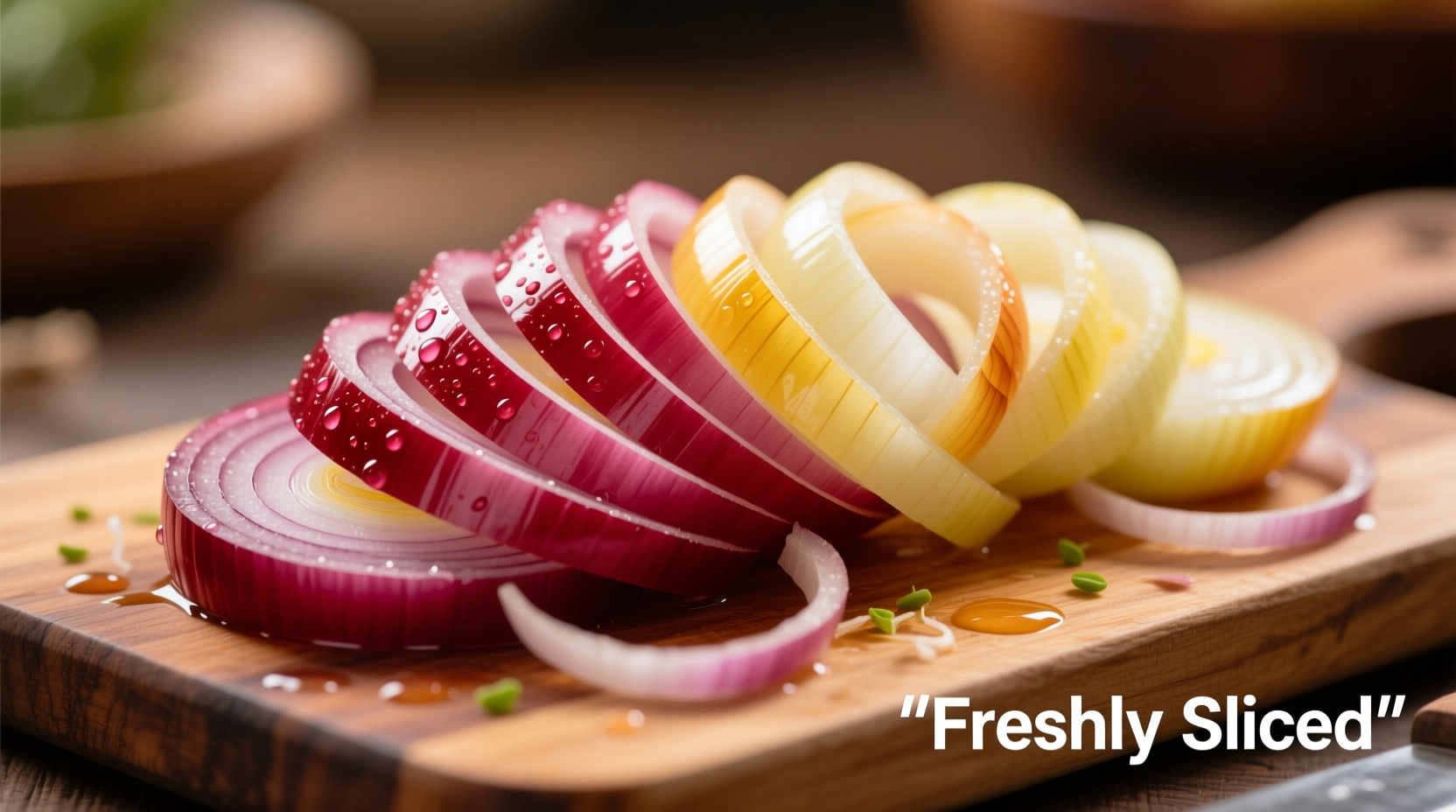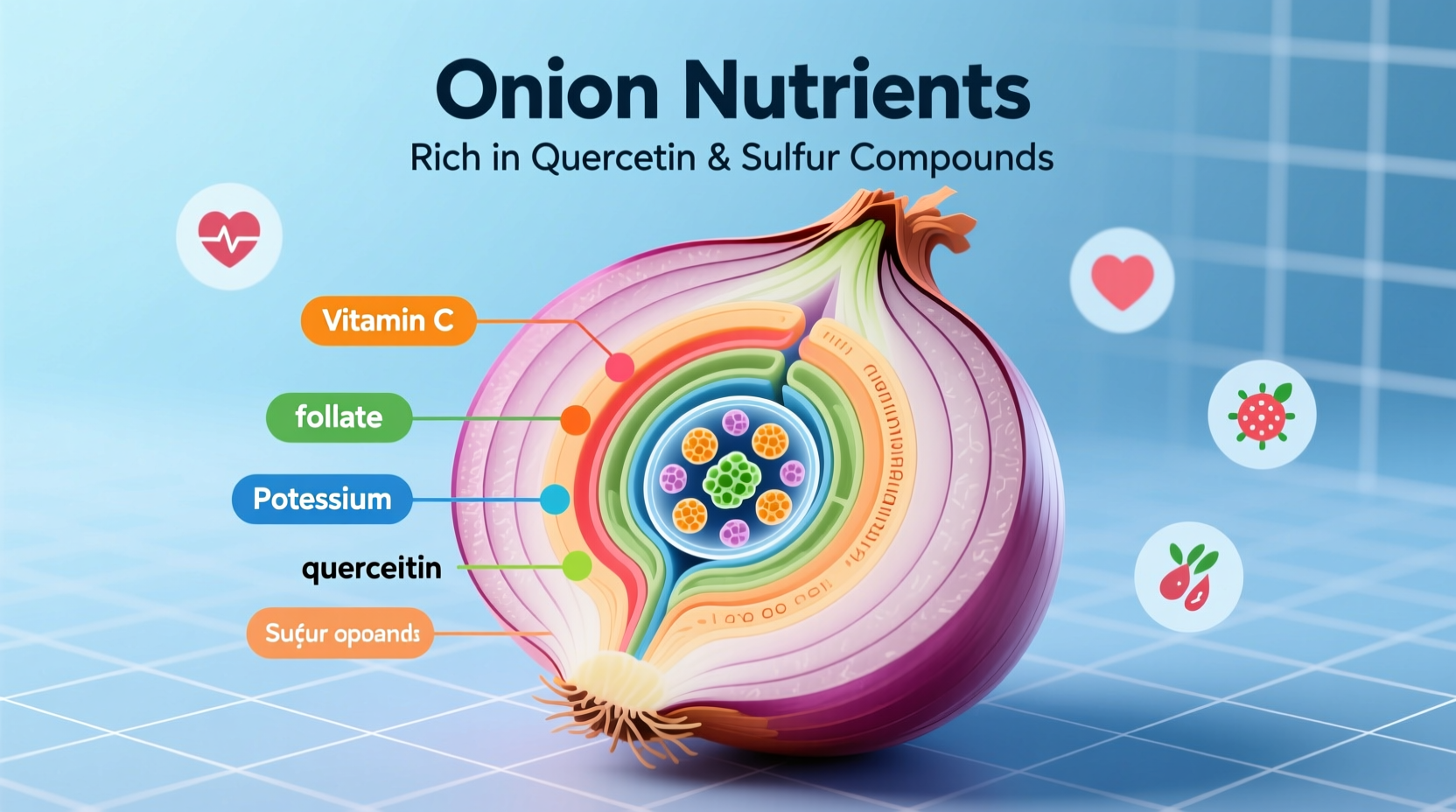Discover why this humble kitchen staple deserves a starring role in your diet. Onions pack a surprising nutritional punch that extends far beyond their flavor-enhancing capabilities. Whether you're slicing red onions for salads, caramelizing yellow varieties for sauces, or enjoying raw scallions in stir-fries, you're gaining access to scientifically-proven health benefits that support multiple body systems.
What Makes Onions Nutritionally Unique
Onions belong to the Allium family, sharing genetic traits with garlic, leeks, and chives that create distinctive health-promoting compounds. The moment you cut into an onion, enzymatic reactions begin converting sulfur-containing amino acids into beneficial organosulfur compounds. This biochemical process explains both the pungent aroma and many of onions' therapeutic properties.
| Nutrient | Per 100g Raw Onion | Daily Value % | Key Functions |
|---|---|---|---|
| Calories | 44 kcal | 2% | Energy provision |
| Vitamin C | 14.6 mg | 16% | Immune support, collagen synthesis |
| Vitamin B6 | 0.12 mg | 7% | Metabolism regulation, brain health |
| Folate (B9) | 19 μg | 5% | Cell division, DNA synthesis |
| Potassium | 146 mg | 4% | Electrolyte balance, nerve function |
| Dietary Fiber | 1.7 g | 6% | Digestive health, blood sugar control |
Data sourced from USDA FoodData Central, reflecting raw yellow onion composition. Note that cooking methods and onion varieties affect final nutrient profiles.
The Power of Onion Antioxidants
Onions rank among the top vegetable sources of quercetin, a flavonoid antioxidant with impressive research backing. Red onions contain particularly high concentrations—up to 1,136 mg per 3.5 ounces—compared to yellow (234 mg) and white varieties (108 mg). This pigment-related difference explains why red onions deliver superior antioxidant capacity.

According to research published in the Journal of Agricultural and Food Chemistry, quercetin in onions demonstrates:
- Significant anti-inflammatory effects by inhibiting histamine release
- Cardiovascular protection through improved endothelial function
- Potential cancer-preventive properties by neutralizing free radicals
- Enhanced blood sugar regulation in clinical studies
Onion Nutrients Through History
The nutritional understanding of onions has evolved dramatically:
- Ancient Egypt (2600 BCE): Recognized for endurance-boosting properties, fed to pyramid builders
- Renaissance Era: Used medicinally for wound treatment and respiratory ailments
- 1950s: First identification of allicin-like compounds in allium vegetables
- 1990s: Scientific validation of quercetin's antioxidant properties
- 2010s-Present: Human clinical trials confirming cardiovascular and metabolic benefits
This historical progression shows how traditional wisdom about onion health benefits has gained scientific validation through modern nutritional research.
Practical Nutrition: Maximizing Onion Benefits
How you prepare onions significantly impacts their nutritional value. Research from the Harvard T.H. Chan School of Public Health reveals important preparation insights:
Optimal Cutting Techniques
Allow cut onions to rest for 5-10 minutes before cooking. This waiting period enables the enzymatic conversion of isoalliin into beneficial thiosulfinates, maximizing the formation of health-promoting compounds. Finely chopping creates more surface area for these reactions compared to slicing.
Cooking Method Comparison
- Raw consumption: Preserves maximum vitamin C and enzyme activity
- Light sautéing (3-5 minutes): Increases quercetin bioavailability by 30%
- Extended cooking (>30 minutes): Reduces vitamin C but creates new beneficial compounds
- Caramelization: Develops unique flavor compounds while maintaining significant antioxidant capacity
Nutrient Synergy Pairings
Combine onions with these foods to enhance nutrient absorption:
- Fat-containing foods (olive oil, avocado) for better absorption of fat-soluble antioxidants
- Vitamin C-rich foods (bell peppers, citrus) to protect heat-sensitive nutrients during cooking
- Other allium vegetables (garlic, leeks) for complementary health benefits
Onion Varieties and Their Nutritional Profiles
Different onion types offer distinct nutritional advantages:
- Red onions: Highest in anthocyanins and quercetin—ideal for raw applications
- Yellow onions: Balanced nutrient profile with excellent storage properties
- White onions: Milder flavor with slightly lower antioxidant content
- Shallots: Concentrated nutrient density with higher mineral content
- Green onions: Rich in vitamin K and carotenoids from the green portions
A 2022 study in Nutrients journal confirmed that red onions demonstrate 2-3 times greater antioxidant capacity than yellow or white varieties due to their anthocyanin content. However, all varieties contribute meaningful nutritional benefits to your diet.
Health Benefits Backed by Research
Scientific evidence supports several specific health benefits from regular onion consumption:
Cardiovascular Protection
The organosulfur compounds in onions inhibit platelet aggregation and reduce blood vessel inflammation. A meta-analysis in Phytotherapy Research found that regular onion consumption correlates with:
- 5-10% reduction in systolic blood pressure
- Significant improvement in arterial flexibility
- Reduced LDL oxidation, a key factor in atherosclerosis development
Digestive Health Support
Onions contain inulin and fructooligosaccharides (FOS), which function as prebiotics that feed beneficial gut bacteria. Research from the National Center for Complementary and Integrative Health shows these compounds:
- Promote growth of beneficial Bifidobacteria and Lactobacilli
- Enhance calcium absorption by 15-20%
- Support regular bowel function and stool consistency
Blood Sugar Regulation
Onion extracts demonstrate hypoglycemic effects in multiple studies. The chromium content in onions enhances insulin sensitivity, while quercetin inhibits carbohydrate-digesting enzymes. Clinical trials published in Nutrition Journal reported:
- 10-15% reduction in fasting blood glucose levels
- Improved postprandial glucose response
- Enhanced insulin sensitivity in prediabetic individuals
Practical Incorporation Strategies
Make onions work harder nutritionally in your daily meals with these evidence-based approaches:
Daily Consumption Targets
Research suggests optimal benefits occur with:
- Raw: 1/2 cup (75g) daily for maximum enzyme activity
- Cooked: 1 cup (160g) daily for consistent nutrient intake
Strategic Meal Placement
- Morning: Add raw red onions to avocado toast for sustained energy
- Lunch: Include in salads with olive oil dressing to boost antioxidant absorption
- Dinner: Sauté with garlic as base for sauces and stews
Storage and Freshness Tips
To preserve maximum nutrients:
- Store whole onions in cool, dark, well-ventilated space
- Refrigerate cut onions in airtight container for up to 7 days
- Freeze cooked onions for longer storage without significant nutrient loss
Important Considerations and Limitations
While onions offer numerous benefits, certain considerations affect their nutritional impact:
- Digestive sensitivity: Some individuals experience gastrointestinal discomfort from raw onions due to FODMAP content
- Cooking trade-offs: Heat destroys vitamin C but increases bioavailability of certain antioxidants
- Medication interactions: High onion consumption may enhance blood-thinning medication effects
- Allergy considerations: Rare but possible allergic reactions, particularly in individuals with latex allergy
People with irritable bowel syndrome may benefit from cooking onions thoroughly to reduce FODMAP content while preserving other nutrients. Those on blood-thinning medications should maintain consistent onion consumption rather than fluctuating intake dramatically.
Onions in Context: Nutritional Comparison
How do onions stack up against other common vegetables?
| Vegetable (100g) | Quercetin (mg) | Vitamin C (mg) | Fiber (g) | Calories |
|---|---|---|---|---|
| Red Onion | 191-1136 | 14.6 | 1.7 | 44 |
| Yellow Onion | 234 | 14.6 | 1.7 | 44 |
| Broccoli | 20.1 | 89.2 | 2.6 | 55 |
| Carrots | 0 | 5.9 | 2.8 | 41 |
| Spinach | 9.9 | 28.1 | 2.2 | 23 |
This comparison shows onions' exceptional position as a quercetin powerhouse while maintaining moderate vitamin C and fiber content. Data compiled from USDA FoodData Central and peer-reviewed nutritional analyses.
Conclusion: Making Onions Work for You
Onions represent one of nature's most versatile nutritional packages—delicious, affordable, and packed with scientifically-validated health benefits. By understanding how different preparation methods affect their nutrient profile and strategically incorporating them into your meals, you can maximize the health advantages these allium vegetables provide. Whether you're building flavor foundations for sauces or adding raw crunch to salads, onions deliver exceptional nutritional value that supports multiple aspects of wellness.











 浙公网安备
33010002000092号
浙公网安备
33010002000092号 浙B2-20120091-4
浙B2-20120091-4